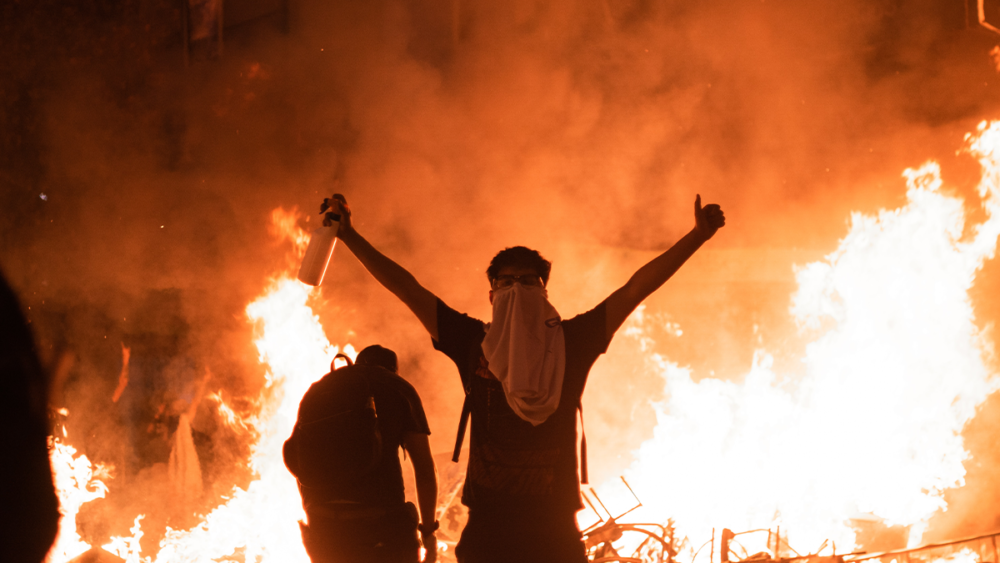Post-Brexit: riots in Belfast and Derry

The Northern Ireland Protocol was not only intended to regulate traffic and trade between Great Britain and Ireland post-Brexit. It was also supposed to prevent old conflicts on the island from flaring up again. Current unrest in Northern Ireland shows that this is precisely what has happened.
Throughout last week, nationalist and loyalist youths clashed in west Belfast. There have been repeated violent scenes involving attacks on police, petrol attacks, and rioting.
On Wednesday night, a bus was hijacked and set on fire. A press photographer was attacked, and clashes again broke out between loyalists and nationalists. Some of the attackers were no more than twelve years old. “It is particularly disturbing that children are being used to orchestrate this violence,” said Irish Minister for European Affairs Thomas Byrne.
“It’s the responsibility of all political and community leaders to calm the situation before someone is seriously injured or killed,” Byrne says. Irish Foreign Minister Simon Coveney also condemned the violence. Speaking to RTÈ Radio, he said the images of violence on the streets were “shocking” and ones he thought would go down in history.
That’s because the photos currently appearing in newspapers could also be a throwback to the years 1968 to 1998 in Northern Ireland. For 30 years, a civil war-like conflict for identity and power raged on the island between Protestants, who as unionists or loyalists wanted to remain part of the United Kingdom of Great Britain, and Catholics, who as republicans advocated for a united Ireland.
The conflict cost the lives of about 3,000 people and did not end until the Good Friday Agreement in the late 1990s. But now it is becoming clear how fragile this agreement actually is.
One reason for the rising violence in Northern Ireland is the handling of alleged coronavirus violations by the Sinn Féin party. At the funeral of republican Bobby Storey last June, 24 members of the party allegedly violated Covid 19 regulations in force at the time. Despite criticism and anger from the population, the Police Service of Northern Ireland (PSNI) recently decided not to prosecute the politicians.
The reason given by the head of the prosecutor’s office, Stephen Herron, was that there was no reasonable prospect of conviction, as each of the people present could point to a lack of clarity regarding conflicting and ever-changing Covid regulations that were in place at the time of the funeral. In addition, there had been an agreement with the police prior to the event.
The public feels left out by these procedures and statements. Added to this is arguably the more serious destabilizer of peace in Northern Ireland: Brexit. The relationship between the UK and Ireland was one of the main issues that needed to be resolved before the UK left the EU.
For a long time it looked as if Brexit would lead to a “hard border”. This would have created an almost 500-kilometre-long external EU border between Ireland and Northern Ireland. This would not only have complicated trade and transport, but above all would have greatly increased the risk of returning tensions and unrest on the island of Ireland.
In order to minimise the potential for conflict, a compromise was finally found. The Northern Ireland Protocol now in force is supposed to regulate a smooth exchange of goods between the countries and allow an open border between Northern Ireland and the Republic.
But things didn’t go as smoothly as planned. Shortly after Brexit, in early January, there were reports of empty supermarket shelves in Northern Ireland. A few weeks later, at the end of January, the EU Commission threatened to control the export of vaccines at the EU’s external border.
Shortly afterwards came the first threats against Irish politicians and journalists – with graffiti smeared on walls in Belfast. Now the situation is getting worse and more and more reminiscent of the Northern Ireland conflict. This is exactly what was feared before Brexit and was supposed to be avoided by the Northern Ireland Protocol.
A heavy police presence, water cannons, and police dogs are now being used to try to settle the unrest. In addition, Taoiseach Michaél Martin and Prime Minister Boris Johnson discussed the “worrying developments” on Thursday evening, according to thejournal.ie.
Afterwards, a government statement said Martin and Johnson “called for calm” and stressed that violence is unacceptable. “The way forward is through dialogue and working within the institutions of the Good Friday Agreement,” the statement continued.
The Agreement, however, has seemingly not eliminated the causes of the Northern Ireland conflict, but only helped to find a solution that both sides can live with. Current developments show how quickly such a ceasefire can collapse. The Northern Ireland regional parliament was called back early from its Easter holidays to discuss how to deal with the street fighting.